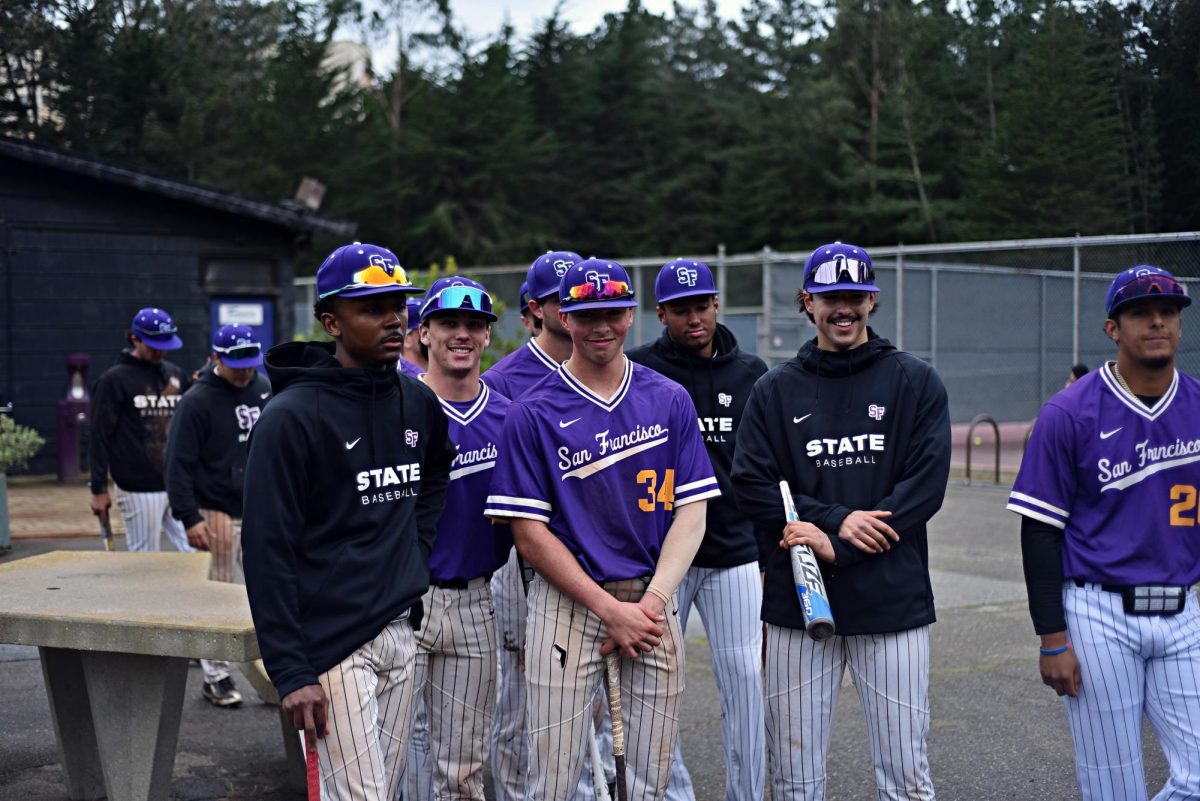Art courtesy of End Rape On Campus (EROC), Title IX.
Title IX investigators illustrated how revised procedures affect students who report sexual misconduct complaints against other students in an April 4 presentation titled “Demystifying Title IX” in the Cesar Chavez Student Center.
The court mandated changes to California State University sexual misconduct investigations come just in time for April, which is Sexual Assault Awareness month.
Why update the policy?
A University of Southern California athlete identified as John Doe was accused of having non-consensual sex with a student athletic trainer. He was expelled following a Title IX investigation and later sued Title IX investigator Kegan Allee, asserting he didn’t get a fair hearing where he could question his accuser and witnesses.
On Jan. 4, the California Court of Appeals Superior Court Judge Howard L. Halm ruled in Doe v. Allee that: “[In] a case such as Doe’s, in which a student faces serious discipline for alleged sexual misconduct, and the credibility of witnesses is central to the adjudication of the charge, fundamental fairness requires that the university must at least permit cross-examination of adverse witnesses at a hearing…before one or more neutral adjudicator(s) with the power independently to judge credibility and find facts.”
Historically, one investigator was charged with collecting evidence, interviewing witnesses, determining credibility, reporting findings and de- ciding whether a student violated the CSU code of conduct. Halm’s ruling found it inappropriate and unfair for a single person to play that many roles.
“The notion that a single individual, acting in these overlapping and conflicting capacities, is capable of effectively implementing an accused
student’s right of cross-examination by posing prepared questions to witnesses in the course of the investigation ignores the fundamental nature of cross-examination: adversarial questioning at an in–person hearing at which a neutral fact finder can observe and assess the witness’ credibility,” Halm ruled.
The interim period
CSU informed administrators across the system of the decision Jan. 10 and they were updated as changes to the investigation policy were drafted, according to CSU spokesperson Toni Molle.
Until the alterations were formally implemented, CSU announced all ongoing investigations would be paused if they were past the investigative
report stage. If a case had not reached this stage, investigations continued as planned. Molle said an estimated 75 cases were affected system-wide.
Schools such as Cal Poly and Sacramento State University alerted their students in early February about the case halts and impending policy switches.
SF State students were outraged at a March 20 meeting to learn the University had still not formally announced the case halts and changes over a month after other campuses reached out to their communities.
“The CSU did not instruct any campus not to discuss the changes with students,” Molle told Xpress.
“We just do not believe that it made sense to send an email that cases were being halted when it affected 15 cases to 30,000 students where the
overwhelming majority of the support and services and programs that we are offering are achieving as they have always been achieving,” SF State Vice President of Student Affairs and Enrollment Management and Title IX Coordinator Luoluo Hong said to the Associated Students board that questioned her at the meeting.
Hong said she withheld information under the guidance of the Office of General Counsel to keep the policy revisions “confidential.”
“The revision of the [Executive Order] process was not ‘confidential,’” Molle said in an email to Xpress. “[But] the process was not as consultative as we would have hoped.”
Ater CSU finalized its new policy April 3, Hong sent a mass email to the community detailing the updates.
Breaking down the changes
The initial evidence gathering process, facilitated after a report is filed, remains unchanged, according to SF State alumnus and Title IX investigator Andrew Velazquez, but the subsequent questioning of that evidence has been altered in key ways.
The new “Hearing Model” differs from the former “One Investigator Model” by providing both the complainant and respondent the option to
attend a hearing where they can supply questions for one another and witnesses. Former aspects of the investigator’s job now belong to a Hearing Officer, whose responsibilities include questioning the complainant, respondent, CSU officials and other witnesses.
Under the new model, both parties will be provided a greater opportunity to add or dispute evidence in a Preliminary Investigation Report and review final reports prior to the hearing process. Hearings can help clarify unresolved questions but are not mandatory. If one party does not want to attend, no evidence will be given on their behalf, and for this reason they are strongly encouraged to attend, Velazquez said.
A separate Hearing Coordinator provides parties with names of witnesses and gives them the option to object to any of the witnesses, though
the coordinator makes the final decision. They also help accommodate the parties if they wish to conduct a hearing through a remote platform so they don’t have to be in the same room as the other party, if that is their preference.
If a Hearing Officer finds a sexual misconduct violation under Executive Order 1097, they will recommend a course of discipline to the university president. Following this, both parties will receive a decision letter addressing any sanctions.
Trauma Talks
SF State alumnus Raghav Kahnijow has a master’s degree in criminology from American University in Washington, D.C. He works in HSS-359 with the Health Equity Institute, an organization committed to eliminating health disparities.
“The checks and balances portion is good,” Kahnijow said. “The changes themselves create a very lawful atmosphere that could probably be traumatic for both a complainant and a respondent.”
He said the addition of more people to the process will likely slow down case resolution and induce more anxiety for both parties.
“People get uncomfortable when a lot of people are involved,” Kahnijow said. “But it makes sense why it came to be—compliance matters with other universities.”
Christina Sabee, SF State senior deputy Title IX coordinator, said the changes were necessary to comply with case law, but due to the hurried
nature of developing the policy, there will be bugs moving forward.
“There are a lot of different challenges that we’ll have in implementing this policy,” Sabee said. “We recognize that it’s not particularly trauma-informed and so we’re trying really hard to make sure that we have even more information about support systems and how to provide that kind
of support for people who are going through the investigation process.”










